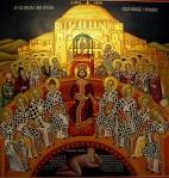You are currently browsing the daily archive for July 7, 2010.
The brotherhood of Elder Joseph at New Skete shortly before his repose: (from left to right) Fr Athanasios, Fr Ephrem (former abbot of Philotheou), Fr Arsenios, Fr Joseph (the author and later Joseph of Vatopaidi), Elder Joseph the Hesychast, Fr Theophylactos, Fr Charalambos (former abbot of Dionysiou)
The following Counsels are compiled by Elder Joseph of Vatopaidi from the teachings of his spiritual father: Elder Joseph the Hesychast
We have already mentioned how difficult it is to describe spiritual figures. We repeat this once again, adding that it is a very bold undertaking to try to enter into the depths and breadth of illumined minds and spirit-bearing beings. But this effort becomes even more difficult when the person undertaking it is ignorant and inadequate to the task. We have therefore ‘cast our anxiety upon the Lord’ (1 Peter 5:7) in order that ‘in the riches of His kindness’ (Rom. 2:4) He may make known to the hearts of our readers ‘what is the breadth and depth and height’ (Eph. 3: 18) of the spiritual realm into which ‘all who are led by the Spirit of God’ (Rom. 8: 14) enter and in which they move, becoming and remaining sons of God. ‘For to all who received Him … He gave power to become children of God’ (Jn. 1:12).
In the spiritual sphere, the human rules of ordinary logic do not apply. This is why St Paul frees spiritual people from obligations, saying, ‘the law is not laid down for the just’ (l Tim. 1 :9). But during the course of the struggle, which is the realm of becoming, there are deficiencies which are evident. Called from ignorance to knowledge – and therefore to faith and repentance – we human beings enter upon a cycle of learning and progress in which the further we advance, the further we reduce the void of our previous deficiency. We see in part, we make progress in part, we are perfected in part: and this by the grace and mercy of God. In this partial progress according to nature, it is to be expected that deficiencies should appear, which are not due, however, to our correct intention bending or giving way, nor to a deviation ‘to the left’. Rather, it is analogous to something that happens with the sun. When the sun has not yet reached its height, its rays do not light up the back of a body so as to bathe the whole body in light. In other words, the spiritual warrior has not yet arrived directly under the fullness of grace, and for that reason he still has some points which are unillumined and, consequently, some deficiencies: but even so, fullness and perfection are his life-long aim.
An almost total lack of practical experience in the spiritual life leads modern man to ask many questions, which we hear constantly in our daily encounters and conversations. Sanctification – in other words, perfection in God – and its real meaning are almost always wrongly interpreted by those who are far from true experience. In fear and modesty, let me mention some of the things the Fathers have said on the subject, so as to interpret the meaning and significance of sanctification according to the patristic spirit. In presenting and commenting on some of the sayings of the pre-eminent Fathers we shall speak about what is meant by ‘sanctification’ – where it begins, where it leads and how it is achieved – in order to help provide some sort of orientation.
It is possible for anyone to taste some form of sanctification, because the struggle and journey towards complete sanctification passes progressively through several stages. Each person, some less and some more, can and should attain to one or another of these stages. The road that leads to sanctification and perfection in Christ is repentance, since we ‘all have sinned, and fall short of the glory of God’ (Rom. 3:23). As one ascends the ladder of repentance, so one encounters the gradations of sanctification. This is the definition of true repentance: that a man regains the divine grace that was lost through sin, or which he was deprived of by living far from faith and knowledge of God. The regaining of grace is not something partial but the totality of adoption, which Christ grants to the faithful through His Church. If they desire, the faithful are able to attain to perfection, in so far as this is possible, which the Fathers divide into three states: purification, illumination and perfection. The third state is called perfection, or dispassion, or divine knowledge, or love for God. It is also called keeping the Sabbath and rest, when man rests from the works of repentance, just as God rested from His works on the seventh day.
The great Maximus the Confessor refers to three more general states commonly found in monks, which characterize those who are approaching sanctification. 1 (Second Century on love, 87; Philokalia, ii.80).
The first consists in ‘not sinning at all in action’: this is the stage of purification and the spiritual warrior, after ‘lawful striving’ (2 Tim. 2:5), passes beyond the state that is contrary to nature. The second is when ‘the soul does not dally with impassioned thoughts’: this is the state of illumination, characterized chiefly by the capacity to receive divine illumination, so that the intellect controls impassioned thoughts. The third state, that of perfection, is when we can ‘contemplate dispassionately in the mind the forms of women and those who have given us offence’: in this state the soul. succeeds in coming near to freedom, because even if impassioned conceptual images are still present they cannot stir the soul to be ravished by them, and this more or less is the principal aim of spiritual life. The right use of conceptual images follows the right use of things and thus evil in general is done away with, because if one does not first sin in the mind one will never sin in action, as the Fathers say.
Faith, divine fear, the fervour that results from these things and strict obedience to the commandments mortify the passionate part of the soul, which is thus turned in its entirety towards God because, in the words of the Apostle, ‘what is mortal is swallowed up by life’ (2 Cor. 5:4). The senses then function according to the law of need alone; they are obedient to self-control, and thus produce mourning and awareness of our sinfulness.
Even though perfection extends to the levels we have spoken of, it is nevertheless possible to participate partially in dispassion. In these three states, even though man is not yet totally perfected, he has nevertheless come to know the law of freedom albeit partially, and acquired experience of sanctification. The same person is in a position to describe both positions exactly: those of grace and of error, of virtue and of vice, of struggle and of defeat and, generally, the mysteries of the unseen war.
At another point St. Maximus distinguishes four gradations of dispassion:2 (Third Century on Various Texts, Philokalia, ii, 22 ) the first type is abstention from the body’s impulse towards the commission of sin. The second is complete expulsion from the soul of impassioned thoughts. The third is the complete quiescence of passionate desire. The fourth is the complete exclusion from the mind of all sensible images. And St Paul, too, recognizes two kinds of perfection, considering himself both perfect and not perfect. He says, ‘Not that I have already obtained this or am already perfect’ and immediately afterwards, ‘Let those of us who are perfect be thus minded’ (Phil. 3:12, 15).
But we consider that the following patristic passages from the Philokalia will help us to a fuller understanding of the terms sanctification and dispassion. According to Maximus the Great, ‘Sanctification is the total complete cessation and mortification of desire in the senses’, (On the Lord’s Prayer, Philokalia ii, 291) and ‘dispassion is a peaceful condition of the soul in which the soul is not easily moved towards evil.‘ (First Century on Love, 36, Philokalia ii, 56 ). According to Abba Thalassius, ‘The person who is not affected either by material things or by his memories of them has attained perfect dispassion.‘ 5 (Third Century, 32, Philokalia ii, 321).
Diadochus, Bishop of Photike, says that ‘dispassion is not freedom from attack by demons … but it is to remain undefeated when they do attack” (On Spiritual Knowledge, 98, Philokalia i, 294); and elsewhere he gives the definition, ‘it is not only to cease from evil that brings purity, but actively to destroy evil by pursuing what is good’. And Abba Isaac the Syrian says, ‘Dispassion is not that we do not experience the passions, but that we do not accept them. For through the many and various virtues that we have acquired, both hidden and manifest, the passions have grown weak within us and cannot easily rebel against the soul, and the mind does not always need to pay attention to them.’ And again Mark the Ascetic says, ‘A mind which by God’s grace accomplishes acts of virtue and has come near to knowledge feels little from the evil and inane part of the soul. For its spiritual knowledge snatches it up on high and makes it a stranger to everything that is in the world.’ St Ephrem the Syrian also says that ‘those who are dispassionate, stretching insatiably towards the ultimate attainable, make perfection endless, because there is no end to the eternal good things’.
These definitions, which are not the only ones, describe as far as is possible for human beings the perfection which in fact remains without end because – as the Apostle says – ‘here we see in part and we know in part’; and only when in the future the final perfection comes, ‘then the partial will pass away’ (l Cor. 13: 10).
This much is the duty of all humans as rational beings, in which nature requires them to stand firm. Infringing these terms reduces rationality to the position of the irrational and unnatural. For man not to sin and to act righteously is a law of nature, and in consequence a duty. The laws of grace begin from here on: they are on the one hand a continuation of what has gone before but are not prescribed for all people, being difficult to achieve and rare, especially under the conditions of life in society. When our Lord was asked what one must do to be saved, He initially cited the keeping of the commandments, as did the great Forerunner as the preacher of repentance. Only to those seeking the highest perfection did He command renunciation, and to follow Him with exactitude (Mt. 19:21).
Standing firm at the first position, the keeping of the commandments, the righteous from all ages were called pure and blameless. Paul often calls them ‘saints’. In the second letter to the Corinthians he refers to all the saints who were in Achaea, while in the letter to the Romans there are several passages where he refers to ministering to the saints who were in Jerusalem, and so forth. Luke mentions that the parents of John the Baptist were ‘both righteous before God, walking in all the commandments and ordinances of the Lord blameless’ (Lk. 1:6).
But the coming of God the Word and the assumption by His Godlike majesty of our own nature raised man to the fullness of his perfection, to his original destiny. To be ‘in the image and likeness’, as the basis of personhood, was now given to man as his inheritance. From that time on noble beings, Godlike intentions, purposes divine in form – with our Lord Jesus as the prototype – have surpassed the law of duty, the ‘law of commandments’ (Eph. 2: 15), and entered into the dogma of love, having received from the Prototype the grace and power to ‘do greater works than these’ (Jn 14:12), ruled and guided by Him. The noble rivalry to enter within the innermost veil where Jesus, the focus of their love, has entered, has become and remained their chief concern. Detached from the causes and occasions by means of which our fallen nature is led astray, they continue this incomparable struggle and – according to Abba Isaac – ’wander about in deserts and mountains and caves and holes in the ground, being ordered in the midst of unruliness’. On the basis of a comprehensive self-denial, these lovers of God bound for heaven not only denied the world and everything to do with it, but even their own souls. And thus, naked of anything of their own, ‘whether within, or without, or around them’, they are given over totally to the grace of the Lord and to ‘lawful striving’, under the guardianship of their teachers in God. During this life-long contest of their sojourn here, they keep ‘their loins girded and their lamps burning’ (Lk. 12:35), according to the Lord’s command, and await ‘power from on high’ and the promise of the Father (Lk. 24:49). ‘Sanctify them in the truth; Thy word is truth’ (Jn 17:17). ‘I in them and Thou in me … that the love with which Thou hast loved me may be in them. and I in them’ (Jn 17:23,26).
(Taken from: Elder Joseph the Hesychast: Struggles, Experiences, Teachings)
The late Elder Joseph of Vatopaidi have passed into eternity on July 1, 2009. Elder Joseph is an exemplary model of ascetic struggle belonging to the great generation of later hesychasts from Mt. Athos and he had been a close disciple of Geron Joseph the Hesychast. Elder Joseph left us many spiritual counsels as he also compiled the life and teachings of his spiritual elder: Joseph the Hesychast. Many theologians and spiritual fathers have rightfully considered Elder Joseph of Vatopaidi a modern day saint.
A documentary on the life of the hesychasts in Mt. Athos (Greek)
A year without Elder Joseph & the Synaxis of the 12 Apostles – double joy to celebrate the luminaries of our church and “a smile from eternity” gazing on the face of the later Elder Joseph Vatopaidinous. The first annual memorial service for the departed elder, took place on July 1st in the Sacred Monastery of Vatopaidi. More about this event, with English translation at: Funeral of Blessed Elder Joseph of Vatopaidi
More about Elder Joseph of Vatopaidi at:
Why’s the smile of elder Joseph of Vatopedi from eternity?


 Christian Dogma
Christian Dogma Christian Martyrs
Christian Martyrs Christian Orthodox Churches and Monasteries
Christian Orthodox Churches and Monasteries Christian Sermons and News
Christian Sermons and News Church's Teachings on Fasting
Church's Teachings on Fasting Ecumenism – a Great Heresy
Ecumenism – a Great Heresy Father George Calciu
Father George Calciu Life_a Sacred Gift form God
Life_a Sacred Gift form God Orthodox Saints and Church Fathers
Orthodox Saints and Church Fathers Spiritual Elders
Spiritual Elders Daily Bible Readings
Daily Bible Readings Journey to Orthodoxy
Journey to Orthodoxy Listen to Ancient Faith Radio
Listen to Ancient Faith Radio Orthodox Calendar of Feasts and Saints
Orthodox Calendar of Feasts and Saints Orthodox Christian Mission Center
Orthodox Christian Mission Center Orthodox Institute
Orthodox Institute OrthodoxChristianNetwork TV
OrthodoxChristianNetwork TV
Recent Comments